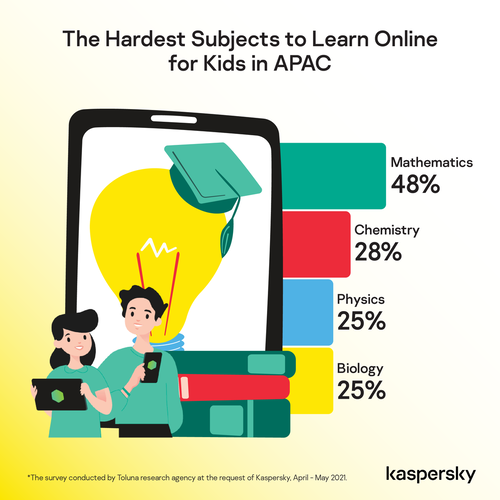A recent survey commissioned by cybersecurity company Kaspersky to evaluate student performance in Asia Pacific (APAC) region during enforced distance learning due to the pandemic revealed that the hardest subject to learn online is mathematics (48%).
This was followed by chemistry (28%) and physics and biology (25% each). This trend is almost the same across the other regions globally.
The survey reports also found that 55% of children preferred face-to-face classroom setting more than online session, it is lowest compared with other regions globally.
Children in Latin America (75%) have the strongest preference for in-person classes over remote learning, followed by Africa (73%) and the Middle East (58%).
According to the survey, the majority of kids in Asia Pacific dislike learning online because of having to spend too much time in front of a screen (74%). Frequent technical problems are also a bummer (60%).
For 57% of students, it is more difficult to understand educational materials on remote learning comparing to offline classes. More than half also admitted missing playing and talking with their peers between classes.
Andrey Sidenko, head of Kaspersky’s online child safety department said the required transition to remote learning during the pandemic has been a real challenge for children and parents and teachers.
“The curriculum needs to be quickly restructured so it doesn’t affect student learning. But unfortunately, due to various circumstances, this hasn’t always been possible. Based on our research, one in every five families, globally, says that the curriculum was fully adapted to the new conditions.
“Despite the fact that offline is still the most effective forms of school education, in our opinion, it is important to introduce various digital and interactive elements into the educational process,” she said.
Meanwhile, the survey results showed that 68% of parents from the region stated they do not want to continue with remote learning format after the pandemic. The main reasons for this are concerns about children spending too much time in front of the screen (68%) and a general decline in the quality of education (48%).
Chris Connell, managing director for Asia Pacific at Kaspersky said remote learning during the pandemic has turned out to be stressful for children, parents and teachers.
“Adults didn’t always make the right decisions to help simplify their children’s lives because they too were adapting to the new format. The conclusion is simple: when the modern world deals a wild card, teachers have to master new teaching skills for remote learning using various digital tools in combination with offline learning,” Connell commented.









